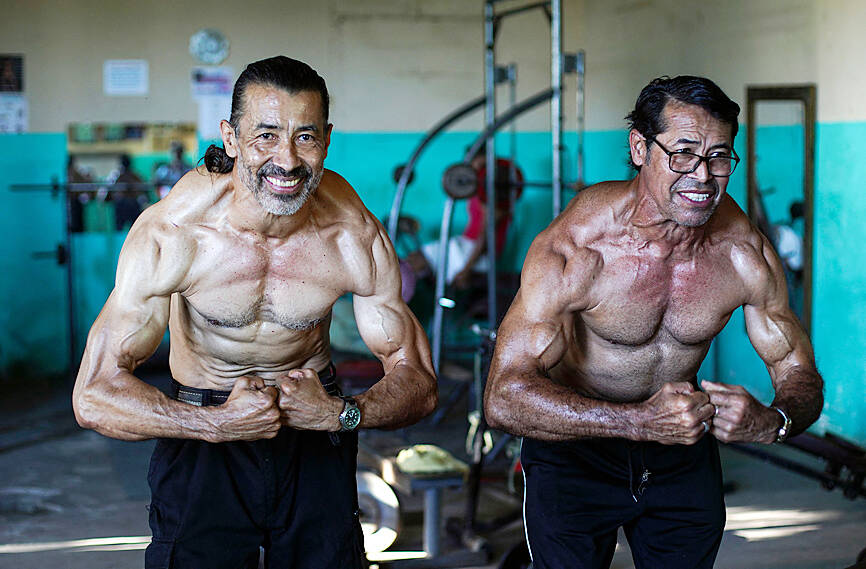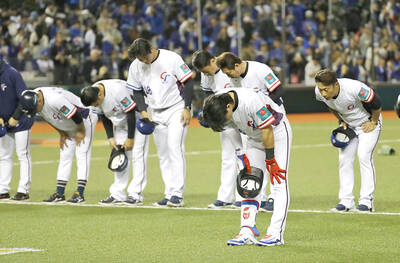A half-century ago, two skinny brothers named Walter and Arturo Perez started lifting stones in their rural Nicaraguan town. Now, they are local legends and TikTok sensations known as the “Hercules brothers” and the “Bodybuilding Grandfathers.”
Because both are deaf, Walter Perez, who is 61, and Arturo Perez, a year older, have not always had it easy, but their bodybuilding achievements have earned them admirers and drawn dozens of young people to train with them in their small gym in Santa Teresa, about 50km south of Managua.
The brothers’ audience has exploded since they began five months ago to post videos on TikTok, where they now have 175,000 followers.

Photo: AFP
“They are a legend here in Santa Teresa, and I think that motivates all of us young people to come here to the gym, because ... at their age they look magnificent,” 33-year-old Ana Saborio said.
“They have long served as an inspiration to me. I was super skinny, but they started training me and telling me what I needed to do,” 28-year-old Porfirio Cortes added.
Although they no longer take part in bodybuilding competitions, the brothers have become popular online since Walter Perez’s son, Yahir Perez, created online profiles and posted images for them.
Their TikTok videos, including exercise routines and recipes for organic smoothies — which family members and friends help produce — have drawn 5.3 million likes. Coming from an impoverished family of five children, Arturo Perez and a sister were both born deaf, while Walter Perez had some hearing, but lost it while still a child.
Their mother taught them to read and write at home, because there were no special schools at the time, Walter Perez said, using a combination of words and gestures that Yahir Perez helped translate.
In their youth, the boys sold newspapers in the street, and faced harassment — even physical attacks — because they could not talk.
That changed when, after seeing a burly new neighbor lifting weights, the brothers began exercising, Walter Perez said.
Lacking money to buy weights, they fabricated them from stones, concrete and tubes.
Hernan Flores, a well-known Nicaraguan weightlifter, heard about them and invited them to train in his Managua gym. In 1988, Arturo Perez won his first national prize, while Walter placed second.
When they first competed, in their twenties, the brothers had to learn to time themselves because they could not hear the music indicating when it was time to change poses. With hard work, they ultimately won 16 medals and around 20 trophies in Nicaragua and neighboring countries between 1988 and 2010.
The awards never paid much, and to survive in one of the poorest Latin American countries they now supplement the income from their gym with modest jobs — Arturo Perez works part-time as a barber and Walter Perez does welding and repairs bicycles.
The gym occupies an old house, its green and white walls covered with old photographs of the brothers in competition. Walter Perez used his welding skills to build many of the exercise machines.
Gym-goers pay just US$2 a week, an amount barely sufficient to keep the place going.
Still, the brothers are enjoying their newfound fame.
Juan Solis, an 82-year-old friend of the family, said that when the brothers were young and in “a pitiable state,” he worried about what they would become when they grew up.
“But now, they have it better than anyone else,” he said with a smile.

Taiwan kept their hopes of advancing to next year’s World Baseball Classic (WBC) alive with a 9-1 victory over South Africa in a qualifier at the Taipei Dome on Saturday, backed by solid pitching. Taiwan last night played against Nicaragua. As of press time, Nicaragua was leading 6-0. Bouncing back from Friday’s struggles on the mound, when Taiwanese pitchers surrendered 15 runs to Spain, Team Taiwan on Saturday kept the visiting team in check, allowing just one run in the bottom of the fourth inning. Starting pitcher Sha Tzu-chen struck out one and allowed no hits, except for a hit-by-pitch over

Taiwan kept its hopes of advancing to the 2026 World Baseball Classic (WBC) alive with a 9-1 victory over South Africa in a qualifier at the Taipei Dome last night, backed by solid pitching. Bouncing back from Friday’s struggles on the mound, when Taiwanese pitchers surrendered 15 runs to Spain, Team Taiwan kept the visiting team in check, allowing just one run in the bottom of the fourth inning. The win was crucial for Taiwan, as a loss would have eliminated the team from contention for the next WBC. Starting pitcher Sha Tzu-chen (沙子宸) struck out one and allowed no hits, except for

Team Taiwan are set to face Spain in a win-or-go-home match tonight for the final berth at the 2026 World Baseball Classic (WBC), despite losing to Nicaragua 6-0 in the WBC qualifier at the Taipei Dome on Sunday. The home team’s loss on Sunday means Nicaragua finish first in the qualifier round in Taipei with a perfect 3-0 record and advances to next year’s finals. After crushing South Africa 9-1 earlier on Sunday, Spain took second place in the four-team qualifier with a 2-1 record. With a 1-2 record, Taiwan finished third while South Africa placed at the bottom with

Team Taiwan avoided missing the World Baseball Classic (WBC) for the first time by defeating Spain 6-3 in a do-or-die game in Taipei last night. After narrowly escaping a mercy-rule loss to Spain in the WBC Qualifiers opener on Friday last week, the home team — winner of last year's WBSC Premier12 title three months ago — got their revenge against the 2023 European champions at Taipei Dome. "It felt quite different from when we won the Premier12," Taiwan captain Chen Chieh-hsien (陳傑憲) said after the game, recalling the ups and downs the team has experienced over the past few days. Unlike in